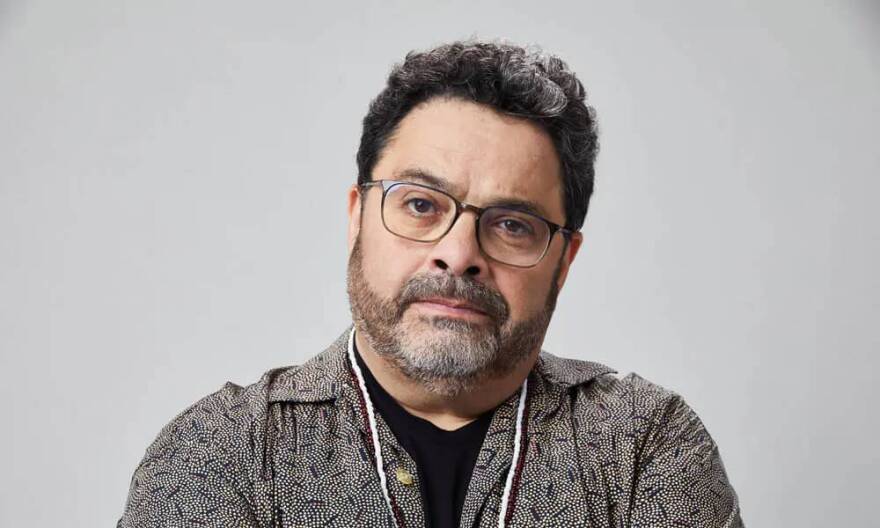Arturo O’Farrill was, by his own admission, a “long-haired, stoned-out freaky kid” of 19, playing piano in a small bar in upstate New York when he caught the ear of pianist and composer Carla Bley. She took a chance on him and invited him to join her band—a pivotal moment for the young musician who, at the time, was actively distancing himself from the legacy of his father, the Cuban-born composer and arranger Chico O’Farrill, a central figure in Afro-Cuban jazz, or "Cubop."
Arturo had already graduated from the High School of Music & Art and was an accomplished pianist, but he rejected what he saw as the prescriptive roles being offered to him in jazz—especially anything labeled “Latin.” He avoided the so-called “Latin thing” like his life depended on it.
His mother was a singer from Mexico, and Arturo was born in Mexico before moving to New York as a boy. Cuban, Mexican, with the last name O’Farrill which was both notable and noticeable for how un-latino it sounded, he was confused.
Bley, famously irreverent and idiosyncratic, welcomed his wildness. “She loved my freakishness, she loved my craziness,” Arturo remembers. “She let me be completely wild and crazy... She encouraged craziness in her musicians, which I thought was amazing. She recognized that in all of us there was this outlier thing—but the biggest outlier of them all was Carla Bley herself.”

He spent three formative years in her band while in college, then went on to play with artists including Dizzy Gillespie, Steve Turre, and Lester Bowie, eventually serving as Harry Belafonte’s music director in the late 1980s. All the while, he continued avoiding his father’s legacy.
That began to change in the early 1990s, thanks to bassist Andy Gonzalez, who encouraged Arturo to explore his roots. “Andy sat me down in his apartment on Fort Independence Avenue in the Bronx and played me the history of this music,” he recalls. “As he played, I realized this thing I had rejected was actually my greatest treasure. And that not only was it profound—it was, in some ways, trickier to play than bebop.”
Arturo began working with the Fort Apache Band and slowly reconnected with the world he had shunned. Eventually—and perhaps inevitably—he joined his father’s band, assisting in Chico’s late-career resurgence. After Chico’s death in 2001, Arturo took over leadership of the Chico O’Farrill Afro-Cuban Jazz Orchestra, which held a long-standing residency at Birdland.
He later founded the Afro Latin Jazz Orchestra (ALJO) at Jazz at Lincoln Center, thanks to Wynton Marsalis, whom Arturo considers a mentor. Though he eventually left the institution, he's continued leading the ALJO and running his nonprofit Afro Latin Jazz Alliance, advocating for an expansive vision of Latin jazz that reaches beyond its Afro-Cuban roots.
For O’Farrill, music is not made for its own sake—it’s a tool for truth. He lives by a variation on the old swing mantra: “It don’t mean a thing if it ain’t got that sting.” That sting is the bite of social consciousness that underpins his work.
“You can just pretend that music is pretty noise, or you can think it's only to soothe,” he tells me. “But I don't believe that's the purpose of art.”
Across projects like The Offense of the Drum, Four Questions (featuring Cornel West), Fandango at the Wall, Cuba: The Conversation Continues, and his forthcoming suite Mundoagua (about the climate crisis), O’Farrill has relentlessly used music to speak truth to power.
"We will never be free in this nation until we can tell the story of slavery and genocide and unbelievable greed,” he says. “We will never be free.”
This year, O’Farrill’s Belongo organization is building a cultural center and community space in Harlem, with performance venues, classrooms, rehearsal studios, and gathering areas. It’s more than a building—it’s the physical manifestation of a belief: that art must serve the people.
Sometimes a conversation doesn’t just explore a person’s life—it opens a window into their soul. That’s what happened when we sat down to talk.

Arturo O’Farrill is a man who contains multitudes: the Mexican-born son of a Cuban composer, a New Yorker who felt othered in his own neighborhood, a musician shaped by the avant-garde freedom of Carla Bley and the institutional authority of Wynton Marsalis. In our conversation, he traced a winding path—from rejecting his heritage to founding the Afro Latin Jazz Orchestra, from feeling like an outsider to becoming a builder of bridges.
He speaks about his creative process with unflinching honesty. Composing, for him, is like “punching yourself in the face.” Each note is a negotiation between doubt and conviction, between ego and faith. But if deadlines are what keep him moving, it’s his sense of purpose that drives the work. For Arturo, music is not just sound—it’s “a form of transportation,” a vehicle for truth, justice, and community.
Whether he’s invoking the legacy of Mingus, the humor of Groucho Marx, or the spiritual teachings of Jesus and Messiaen, O’Farrill speaks with radical clarity and humility. He doesn’t claim to have the answers. He claims the right to ask the questions. And maybe that’s what this moment needs most.




